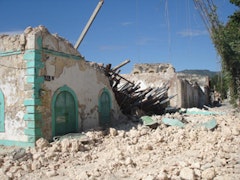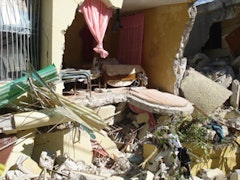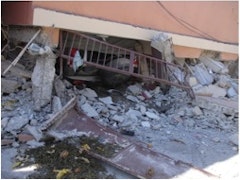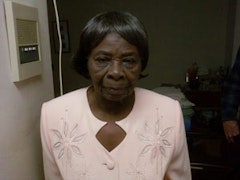Local
Perspectives on the Quake
For the time being we all sleep in the streets, because it’s not recommended to go inside of a house. Most of us have no tent. I am sleeping in a neighbor’s front yard, under the sky without any protections. During the day we have the sun and in the night we have the rain and it’s very bad for us living like this but we have no choice. We are a country of homeless and unemployed people. Life is very difficult in Haiti right now.
—Georges Metellus, Jacmel resident 1-27-09
Report from Jacmel
By Jacques Africot

At 4:53 p.m. on Tuesday, January 12th, I was attending a class at the Jacmel branch of the UNASMOH (Université Américaine des Sciences Modernes d’Haiti) when the Earthquake hit. I was in Indonesia after the Tsunami in 2005; I learned there that during an earthquake, the safest position is under the door frames in a building. But, once we felt the shaking here, everyone in my classroom—including the teacher—stood up and started running to get out of the building. We were on the 2nd floor and scrambled to the stairs. I tried to stop my colleagues and tell them what to do, but they were gone. While yelling, I felt a brick hitting me on my head and I fell down. Then I felt other bricks falling on my back, my arms. I thought that this would be my last minute living. Fortunately, everything stopped.

I stood up and went out. I couldn’t see because of all the dust from the falling bricks. I soon realized that the rest of the university was almost completely collapsed, but my classroom didn’t fall. All the students and the teacher had to go to hospital afterward because they were severely injured. I spoke to one of my classmates the next day around 10 a.m. He said that he did not know what happened. He didn’t even remember that he was in class.

I left the campus with other students by using the tops of other nearby houses that are lower than the school building. Then, I realized that it was not only our campus that had collapsed but almost all buildings in the city. I tried to reach home to see if my orphanage and my family felt the earthquake, but my phone didn’t work. I couldn’t find a taxi or a tap tap (public bus) to go home. Everyone was touching one another and trying to reach another close person to see if he or she was alive or safe.
Fortunately, when I arrived home (at the local residence of Orphans International Haiti) in Cyvadier, just outside Jacmel, I found no damage at all. All the kids were safe and the house was intact. My father’s house nearby had collapsed, but no one was affected physically. The children at the Orphans International House were very scared. They didn’t want to step in the house again. For them, it was like the house was moving during the earthquake. They didn’t want the house to collapse while they were inside.
Many other houses collapsed in Cyvadier. But it is the town of Jacmel that is really affected. The city must be rebuilt.
The Return of Madame Marc
By Toni Cela
My grandmother, Elinise Francois, flew into Port-au-Prince on Tuesday, January 12, three-and-a-half hours before the quake. A resident of Westchester County for the last 30 years, Madame Marc, as everyone calls her (after her belated husband Marc Francois), regularly goes back home for the winter. After working for many years as a housekeeper, my grandma, who is 83, is now retired. Over the last few years, she has been building a home in Mariani, near Carrefour. Illiterate, but quite knowledgeable, she sent ample food rations ahead for this year’s trip, including barrels of beans, rice, corn meal, flour, sugar, and water.

I was teaching a class when I found out about the quake. From that evening through the weekend, we heard nothing from my grandma or her nephew who lived in the house in Mariani. As I watched hours of disaster coverage on CNN, and spoke to my family and others in the Haitian-American community, I felt a swirling current of emotions: fear, anxiety, hope, doubt, and everything in between. Most of all, I anguished over why I had purchased my grandma’s plane ticket for Tuesday, January 12. If we had only chosen one day later, everything would be okay, at least for her. The Haitian proverb ou konn Jodi men ou pa konn demain (tomorrow is not promised) seemed like cold comfort.
On Sunday morning, the 17th, we received a message via my grandma’s niece that my grandma and everyone in the house in Mariani were okay. A few of our cousins in Port-au-Prince died. While her niece was on her way to the airport to be evacuated, we could only hope that my grandma would be doing the same. Since we couldn’t get through to her nephew’s cell phone, we had no idea about what hardships she faced.
Finally, on Tuesday the 19th, my phone rang at 6:30 in the morning. It was my grandma’s nephew. After assuring me that things were okay, the phones kept cutting out. It took about seven tries before we finally connected again. He put the phone on speaker. I told my grandma that she should evacuate and explained the procedures. Since her neighborhood is slightly off the beaten path, and now had no electricity, news of what was happening was only trickling in. She hadn’t heard about the evacuation, but leaving wasn’t her primary concern.
Instead, she said, “Map fe deux semaine” (I’m going to do two weeks). She had “things to take care of,” my grandma explained.
From her authoritative tone, I knew she could not be deterred from her plans. So I asked her to call me the following Sunday with her departure date.
As it turns out, my grandma only spent one more week in Mariani. She returned to New York via Orlando on Tuesday the 26th. The other day I visited her at her home in White Plains, where she recounted her experiences.
Madame Marc had arrived at her home shortly after 4:00 on Tuesday the 12th. After saying a prayer, she began to unpack her things. A few minutes before five o’clock, she was sitting in a chair taking stuff out of her suitcase. All of a sudden, the chair began moving, and she thought her nephews had snuck up behind her to play a joke. She saw that this was not the case, and realized that the whole house was moving. She next thought that someone was working on a car in the garage, and so yelled at him to stop. Finally, her nephew came and told her that people were outside screaming “earthquake!”
Afterwards, she realized unlike many houses nearby, hers was intact. It was a pre-fab house, sturdier than those built with cheaper materials. Before my grandma arrived, she had also arranged for her large well to be refilled with purified water. Her barrels of food, clothing, and various supplies had also gotten there before she did. By nightfall, Madame Marc’s house became the supply station for the neighborhood.
For the next two weeks, Madame Marc dispensed her rations of food and clothes to her neighbors. Over a charcoal fire, she first cooked perishables, like hot dogs and chicken, after which came the beans and rice. After a few days, her most desired commodity was the “crackers” she brought. At her White Plains apartment, I asked her which type of crackers she was referring to. She went into her kitchen and came back with a bag of Doritos. I realized that in a crisis, people will eat whatever they can.
Madame Marc had also sent ahead sheets and clothing, which she intended to donate to the local hospital. After a school had collapsed in Port-au-Prince in late 2008, killing and injuring many students, the inadequacies of the hospital had been brought to light. So for the last two winters, she brought food and various materials for the hospital. The result was that she now had sheets to give the neighbors who were sleeping outside. People thought she was crazy to sleep inside, but my grandma thought her house was okay. In any case, both day and night, everyone feared and endured the constant aftershocks, or what my grandma described as “thunder from the ground.”
As she gradually began to hear more news about the severity of the crisis in Port-au-Prince and beyond, my grandma began to realize that she should come home. Her family and neighbors encouraged had her to do so, but on the day Madame Marc left, they all cried. They had no idea if organized rescue efforts would reach them.
On her way to the airport, her driver decided to give her a tour of the damage in and around Port-au-Prince. My grandma now realized the extent of the destruction. After spending the day at the airport, she boarded a military cargo plane. On it, the elderly were given the only seats, whereas everyone else sat on the floor. Whenever there was turbulence, the passengers would scream, and when it was over, they’d go back to sleep.
My grandmother is safe and sound in White Plains now. All of us Haitians can only wish that the whole experience was a bad dream. But when “things get better” down there, my grandma plans to return and finish the second-level addition to her house.

